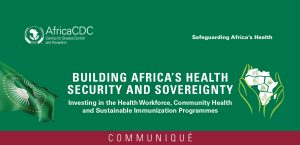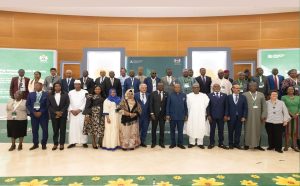The Journal of Public Health in Africa (JPHIA), owned by Africa CDC, is planning to surpass its past publication output from African authors through mentorship. Mentoring researchers and further moving public health discourse from the background to the forefront, will highlight Africa CDC’s contributions to shaping evidence-based policies and interventions to address pressing health challenges in Africa.
Building on its efforts to strengthen African research capacity, JPHIA kicked off 2025 with a pivotal consultative meeting in January in Kigali, Rwanda. Bringing together Centres of Excellence, national public health institutes, prominent scientists, JPHIA editorial board members, and section editors, the meeting focused on strategies to elevate the journal’s standing in public health research across Africa and beyond.
“The consultative meeting was timely as we are started the New Year – it provided us with strategic activities that will enhance the scientific publishing capacity of African researchers and improve the quality of JPHIA,” said Dr. Nebiyu Dereje, the interim editor-in-chief of JPHIA.
Participants from 16 African countries engaged in interactive sessions, hands-on exercises and one-on-one mentorship. This specialist-led training covered research design, data analysis, ethical considerations, and the publication process, with a focus on literature reviews, manuscript structuring, and the effective use of AI tools to achieve research efficiency.
“This kind of hands-on practical training on scientific writing should continue to ensure that African early-career researchers have optimal publishing capacity,” said Dr. Dereje.
Several strategic directions were recommended at the meeting. Some of these include emphasising the vitality of turning routine data into manuscripts by NPHIs, strengthening the scientific writing capacity of African researchers, enhancing the peer-review and editorial processes of the JPHIA, and promoting the journal across various platforms.
“Strengthening the scientific publishing capacity of African researchers is critical to shaping the global health research ecosystem. Unique African research findings, perspectives, practices, stories, and implementation lessons must be disseminated and should influence the global health architecture,” said Dr. Dereje. JPHIA is well-positioned to strengthen this publishing capacity for African researchers, he added.
In December 2024, JPHIA hosted a manuscript writing workshop on priority diseases in Kigali, Rwanda, to strengthen African representation in global health research. Held in partnership with the Africa Public Health Foundation, the workshop sought to equip early-career researchers and public health professionals with the skills to develop and publish high-quality manuscripts.
JPHIA has been Africa CDC’s official journal since 2018, serving as a peer-reviewed platform. With nearly 6 years of history, JPHIA is a vital resource for African public health experts. The journal has 17 sections to comprehensively address public health challenges in Africa.
In 2024, JPHIA explored pandemic preparedness, disease surveillance, antimicrobial resistance, vaccine rollout strategies, and the intersection of climate change and health. Notable research focused on Africa’s response to ongoing mpox outbreaks and the need for global solidarity in tackling emerging infectious diseases. Despite Africa shouldering 25% of the global disease burden, African authors contribute only 3% of health-related research – a gap blamed on limited funding and research capacity, as well as biases in scientific publishing. African stories and perspectives are often told by non-africans. Thus, expanding opportunities for African researchers is crucial to ensuring that local knowledge informs solutions to the continent’s health challenges.







